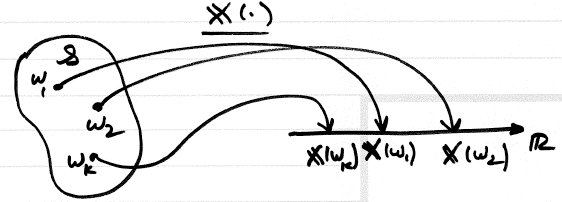1. (15% of Total)
This question is a set of short-answer questions (no proofs):
(a) (5%)
State the definition of a Probability Space.
Answer
You can see the definition of a Probability Space.
(b) (5%)
State the definition of a random variable; use notation from your answer in part (a).
Communication, Networking, Signal and Image Processing (CS)
Question 1: Probability and Random Processes
August 2003
Answer (74p on Papoulis)
A random variable $ \mathbf{X} $ is a process of assigning a number $ \mathbf{X}\left(\xi\right) $ to every outcome $ \xi $ . The result function must satisfy the following two conditions but is otherwise arbitrary:
1. The set $ \left\{ \mathbf{X}\leq x\right\} $ is an event for every $ x $ .
2. The probabilities of the events $ \left\{ \mathbf{X}=\infty\right\} $ and $ \left\{ \mathbf{X}=-\infty\right\} $ equal 0.
Answer (Intuitive definition)
Given $ \left(\mathcal{S},\mathcal{F},\mathcal{P}\right) $ , a random variable $ \mathbf{X} $ is a mapping from $ \mathcal{S} $ to the real line. $ \mathbf{X}:\mathcal{S}\rightarrow\mathbb{R} $ .
(c) (5%)
State the Strong Law of Large Numbers.
Answer
You can see the definition of the Strong Law of Large Numbers.


